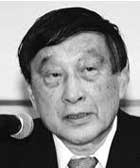| 【特集】第32回定例シンポジウム「『歴史戦』をどう闘うか」 |
| 《報告》 |
「アメリカでの歴史戦」概要
Overview of the History Wars in the United States
|
産経新聞ワシントン駐在客員特派員 古森義久
KOMORI, Yoshihisa Sankei Shimbun Associate
Correspondent Stationed in Washington, DC
|
 アメリカにおける日本の歴史問題がなぜ重要なのか アメリカにおける日本の歴史問題がなぜ重要なのか
米国における日本が絡む、所謂、歴史問題の現状・変遷について報告をさせていただきます。日本が関連している歴史問題というのは、ご存知のように中国や韓国からは、ドンドン批判が来るのですけれども、最近の日本では中国や韓国が何を言ってもそれほど気にしないという感じになっています。客観的な日本の国益というものを考慮しても、平然としていても大丈夫な部分というのはかなりあります。
しかし米国から日本に対して、歴史問題を理由にして非難の矢が飛んでくるというのは、これは少し重みが違ってくる。何といっても、米国は世界唯一の超大国であり、日本の同盟国であります。しかも国際世論の発信の舞台になりやすいということで、重みが違うわけです。古い表現ですが「米国がくしゃみをすると日本が風邪を引く」という状況がまだまだあるわけです。この歴史問題もその範疇に入るという気がします。従ってこの問題を放っておくと、米国からの本格的な歴史問題を理由とする日本非難、日本糾弾というのが、日米同盟にまで悪影響を及ぼしかねない。日本にとっての事態が深刻になり得るため、米国での「歴史戦」には、我々は特別な注意を払う必要があると思います。
私自身は、新聞記者として長年ワシントンに滞在してきました。通算3回、毎日新聞記者として、そして産経新聞記者として合計20数年ですが、その間に当然のことながら歴史問題なる現象をいやというほど観察し、体験してきました。今この瞬間でも、例えば先ほど平川先生からお話があったマグロウヒルという出版社の高校生用の歴史教科書に、この日本の慰安婦に関してとんでもない記事、虚構が書いてあります。日本側からは珍しく政府と民間の両方がしっかりと抗議をしました。特に3月17日にここにいる先生方を含めて、19人の日本の学者が対外的に抗議と訂正の求めを発表したということは、米国側にも大きなインパクトがありました。この点については後ほどご説明いたします。とはいえ米国側は訂正の求めには応じない。逆に日本の抗議を歴史の修正とか改竄と言って逆襲してくる。慰安婦の組織的な強制連行がなかったことを朝日新聞が認めても、米国側の学者や研究者たちは全く認めようとしない。この年来の状況は少なくとも、表面的には全く変わっていません。
こうした誤認に基づく形で慰安婦の像や碑が米国各地で建立されています。
--------------------------------------------------------------------------------------------------------------------------------------------------------
Why is the Japanese history controversy in the US important?
This report will examine the present state, and past changes, of the so-called “history controversy” involving Japan now taking place in the United States. As you are well aware, China and Korea have been incessant in their criticisms, using the controversies surrounding Japanese history. Recently, though, Japan has appeared rather indifferent to these criticisms, regardless of what the Chinese or Koreans have said. Even in terms of a consideration of Japan’s objective national interests, there are many areas of the issues where it is all right for Japan to remain calm without offering any kind of response.
It is a somewhat weightier matter, though, when the slings and arrows of criticism over these historical controversies begin flying in Japan’s direction from the United States. The fact of the matter is that America is the world’s sole superpower, and is also an ally of Japan. This, coupled with the ease with which the United States sets the stage for world opinion, makes the American criticism graver than that from China and Korea. It is an old expression, but nevertheless still true: “When America sneezes, Japan catches a cold.” And I feel that this intimacy of influence holds true in the case of these historical controversies, as well. It follows, then, that if these issues are left to fester, then it isn’t outside the realm of possibility that American criticisms and denunciations of Japan predicated upon a full-blown historical controversy could exert a negative influence on the Japanese- American alliance itself. Because Japan could find itself in a serious situation, I am of the opinion that we must exercise particular caution when engaging in history wars within the United States.
I have spent many years in Washington, DC, as a newspaper reporter, with more than two decades of experience in the American capital over a total of three assignments, for both the Mainichi Shimbun and the Sankei Shimbun. It goes without saying that, during that time, I have observed, and experienced, more than my fair share of the historical controversy phenomenon. Even now, for instance, we have the high school history textbook, published by McGraw-Hill and mentioned in a separate speech by Prof. Hirakawa Sukehiro, which contains preposterous falsehoods about the Japanese comfort women. In a rare development, both the Japanese government and private sector have been clear in remonstrating with McGraw-Hill over the textbook’s errors. Of particularly great impact in the United States were the objections raised by nineteen scholars in Japan on March the 17th - including some of the scholars in attendance today - in a setting designed to be easily understood overseas, as well as the requests for corrections raised by those same scholars. I shall explain more about this below. Suffice it to say here, though, that the Americans refused to accommodate these requests for corrections. Indeed, not only did the Americans refuse, they went on the counteroffensive, characterizing the Japanese objections as revisionism and attempts to whitewash history. Even though the Asahi Shimbun has admitted that there were no systematic forced abductions of comfort women, the American scholars and researchers absolutely refuse to admit the same. On the surface, at least, the situation that has continued for many years still remains unchanged.
Based on such mistaken understandings of Japanese history, comfort women statues and memorials have begun cropping up all across the United States.
|
続きをご覧になりたい方は...
|
|